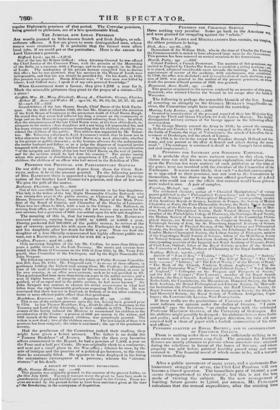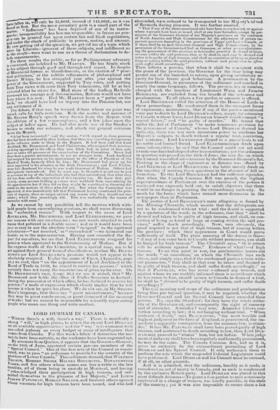After a public movement of many years, and a systematic
Par- liamentary struggle of seven, the Civil List Pensions will soon become a closed question. The immediate gain of 10,0001. a year seems disproportioned to the turmoil ; but this is not the true mode of' viewing the subject; By the new arrangement of limiting future grants to 1,2001. per annum, Mr. Fixtxisox calculates that the annual expenditure, after the existing lives have fallen ha, wt only be .35,000/. instead of 145,0001., as it svas found at first. But the mete pecuniary gain is a small part of the matter.
" Influence" has been deprived of one of its instru- " Influence" has been deprived of one of its instru-
menta. irresponsibility has become responsible; in future no pen- , sial can be gunned but upon certain fair and fixed regulations, and under the check of publicity in person, motive, and amount. By now getting rid of the question, we get rid too of a topic which ere lip Liberals—ignorant of these subjects, and indifferent as °Ito the result—were wont to use as a theme of declamation to de- lude constituencies. For these results the public, so far as Parliamentary advocacy is concerned, are indebted to Mr. HARVEY. He has firmly stuck to his subject through good and through evil report. In despite of Ministerial frowns or blandishments, or the caution of " prac- tical politicians," or the subtile refinements of philosophical and literary Whigs, he has struggled year aftet year against the power of the Government, supported by Tory votes, and putting forth Tory views with more than Tory vehemence, till he at last extorted what he strove for. Had more of the leading Radicals possessed his courage and determination, Reform would not have sum where it is now. lied Mr. HARVEY been a " patter on the back," we should have bad 110 inquiry into the Pension-list, nor any settlement of it.
The debate, if that can be termed debate where no point was raised, calls for little critieism. Both the nether and manner of
Mr. SPRING RICE'S speeds were drawn from the Report. with the addition of a few commonplaces, and a few jokes upon the subject of ladies ages. lie had also made use of the Sunday's leisure to study our columns, and attack our general criticism upon the Report.
"It had been insinuated," said the orator, " with regard to those pensions
that Jul been abandoned by their holders, that there was something disingenuous io the reference made to them in the Report. It had been said that Lord Auckland, Mr. Drummond, and Lord Elphinstone, who resigned their pensions on being appointed to the offices they now filled, had. in point of fact, only done so under the pressure of the examination of the Committee. Never had there been a greater misstatement, to use no stronger term. Lord Auckland had resigned his pension on his appointment to the office of President of the Board of Trade, formerly filled by him ; Mr, Drummond had given up his when appointed to his situation in the Irish Government ; and Lord Elphin- stone had abandoned his when he was tirade Governor of Madras. Others had sulwequently surrendered. But lie must say, he thought it would not be just or generous to say of the individuals who had thus surrendered, that what they did was done under the expectation of this examina•ion. He knew that, pre- viously. many persons holding pnsions were withheld from surrendering by the apprehension lest if they did so they might he considered as throwing dis- credit on the motives of those who dill not. But when the Committee was appointed, it was immediately felt that Parliament having sanctioned the prin- ciple of inquiry, there no longer existed any reason why they should not sur- render; which they accordingly did. This was undoubtedly the reason of surrender with some."
As we cannot by any possibility tell the motives which with- held people from surrendering pensions, we shall waive discussing the " undoubted reason." With respect to the cases of Lord AUCKLAND, Mr. DRUMMOND, and Lord ELPHINSTONE, we gave our reasons with our conclusions : we saw words attached to each name that paltered in a double sense ; and as it would have been just as easy to use the absolute term " resigned" as the equivocal substitutes—" not received," or " surrendered "—we intimated our doubts as to the representation. Having now consulted the Re- port for ourselves, we see that Lord Esen I :anon: resigned his pension when appointed to the Governorship of Madras. Bat if the express words of the Committee, in a special case, are to be set against their general term of classification, neither Mr. DRUM- lioNns nor Lord AUCKLAND'S pensions would yet appear to be absolutely resigned. Under the name of EDEN, (Appendix, page 46.) we read, that " on the appointment of Lord Auckland to the Board of Trade in 1830, he ceased to receive his pension :" which certainly does not carry the construction of given up for ever. On Mr. DRUMMOND'S case, (page 46.) we see it stated, that " Mr. Drummond now holds the office of Under-Secretary in Ireland ; during the possession of which office, he has declined to receive his pension :" a mode of expression which dearly implies that he will resume it when he quits his place. We do not say, in Mr. SPRING RICE'S language, that these are " great misstatements," because they may be great carelessness, or great disregard of the meaning orwords: but we cannot be responsible for correctly repre,euting people who mean one thing and write another.



























 Previous page
Previous page